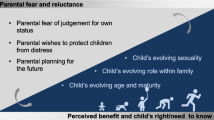Abstract
Qualitative interviews were conducted with mothers (N = 47) who had disclosed their HIV status to their children. The majority of mothers explicitly told their child not to disclose to other people that she was HIV-positive because they feared repercussions in the way of stigma and ostracism for both themselves and their child. Approximately one-fourth of the mothers identified “safe people,” to whom their child could discuss her serostatus, such as family members, health care providers, or therapists. The majority of the children respected their mothers' wishes; only four children disclosed to someone after being explicitly told not to do so. A significant number of children expressed concerns about their friends finding out, fearing that they would be ostracized or that it would be assumed they were also infected. In addition, the children did not want others to find out because they wanted to protect their mothers. The burden of keeping the secret of their mothers' serostatus does seem to be a stressor for some of the children.
Similar content being viewed by others
REFERENCES
Black, L.W. (1993). AIDS and secrets. In E. Imber-Black (Ed.), Secrets in families and family therapy (pp. 355–369). New York: W. W. Norton & Co.
Draimin, B. H. (1993). Coping when a parent has AIDS. New York: The Rosen Publishing Group.
Faithful, J. (1997). HIV-positive and AIDS-infected women: Challenges to mothering. American Journal of Orthopsychiatry, 67, 144–151.
Marks, G., Bundek, N. I., Richardson, J. L., Ruiz, M. S., Moldonado, N., & Mason, H. R. C. (1992). Self-disclosure of HIV infection: Preliminary results from a sample of Hispanic men. Health Psychology, 11, 300–306.
Moneyham, L., Seals, B., Demi, A., Sowell, R., Cohen, L., & Guillory, J. (1996). Experiences of disclosure in women infected with HIV. Health Care for Women International, 17, 209–220.
Murphy, D. A., Steers, W. N., & Dello Stritto, M. E. (2001). Maternal disclosure of mother's HIV serostatus to their young children. Journal of Family Psychology, 15, 441–450.
Seidel, J., Friese, S., & Leonard, D.C. (1995). The Ethnograph, Version 4.0. Amherst, MA: Qualis Research Associates.
Strauss A., & Corbin J. (1990). Basics of qualitative research: Grounded theory procedures and techniques. Newbury Park: Sage Publications.
Weiner, L., & Septimus, A. (1990). Psychological consideration and support for the child and family. In P. Pizzo (Ed.), Pediatric AIDS: The challenge of HIV infection in infants, children, and adolescents (pp. 577–594). New York: Williams and Wilkins.
Author information
Authors and Affiliations
Corresponding author
Rights and permissions
About this article
Cite this article
Murphy, D.A., Roberts, K.J. & Hoffman, D. Stigma and Ostracism Associated with HIV/AIDS: Children Carrying the Secret of Their Mothers' HIV+ Serostatus. Journal of Child and Family Studies 11, 191–202 (2002). https://doi.org/10.1023/A:1015177609382
Issue Date:
DOI: https://doi.org/10.1023/A:1015177609382




